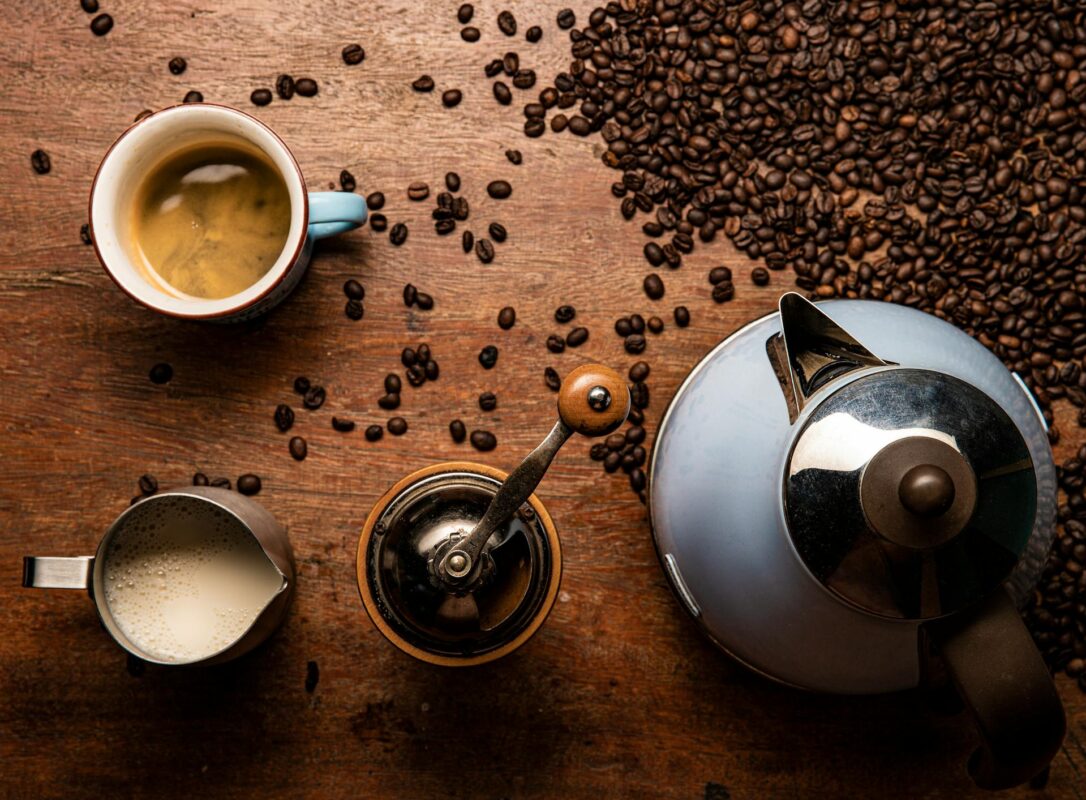1- How long does your coffee last fresh and tasty?
Our coffees taste best when brewed between days 10-50 post-roast date (which is indicated on each coffee bag label). After 50 days, flavours may start to fade and lose acidity.
We currently do not use any nitrogen flushing—the coffee is bagged as is when it comes out of the roaster.
3- What’s the difference between light and dark roast coffee?
You may have seen that there are different types of roasted coffee beans: these can range from light roast to dark roast.
Other than the visual difference (dark roast beans are indeed darker in colour!), there are some key flavour differences too.
Dark roast coffee beans have been roasted for longer, and have been heated to higher temperatures.
Due to the breakdown of acids in the roasting process, they become denser and a more bitter flavour is produced.
Depending on how you like your coffee, that more bitter flavour could be a pro or a con.
In contrast, light roast coffee beans are roasted for less time, and therefore less of a bitter flavour is produced.
We generally make light to medium roast coffee beans, simply because this method retains the natural sweetness and flavours from the original raw bean.
5- What coffee should I choose?
This is a very difficult question to answer! It’s really down to you and your coffee preferences.
If you’re interested in experimenting with single origin coffees, we recommend looking closely at the flavour notes before you buy them.
If you know that you like chocolate-y, fudge-y flavours, then try coffees which have those flavours You also need to think about what will work best with your brewing method of choice.
Lightly roasted single origin beans work particularly well in filter coffees because they have more subtle flavours to be extracted.
You can get the best flavours out of a single origin coffee by brewing them with something like a Hario V60 or a Chemex.
Whereas using a single origin for espresso can be tricky because they are less versatile, and because they can get lost if you serve them in a milky drink such as a latte.
2- Do you use Arabica or Robusta coffee beans?
There are essentially two main species of coffee: the prized Arabica and the lower quality Robusta. Arabica trees have long been recognized for producing superior coffee beans. They grow almost exclusively at higher altitudes, and are cultivated with more care than Robusta trees. Arabica coffee “cherries” are handpicked so that only the perfectly ripe ones are processed. Most of our coffe come from Arabica coffee trees grown on the best coffee estates and plantations around the world. These premium beans are what give our coffees their distinct and complex flavors.
Toaster Al Maraya sells the highest grades of Arabica coffees that are delicate , flavorful and sell at higher prices because of their quality and limited availability.
4- What do I need to make great coffee at home?
There are a couple of elements that we think are essential to making great coffee at home!
Scales:
To brew fantastic coffee consistently, you’ll first need to measure how much ground coffee you are using, plus the amount of water you will pour over the coffee to make your perfect cup. This is called the coffee to water ratio or brew ratio, and it’s extremely important for making high-quality coffee. For example, 1 gram of coffee to 18 grams of water (meaning for every unit of coffee you should use 18 units of water). You’ll never be able to get this precise a measurement if you’re not using a digital scale.
Filtered water:
The water you use to brew your coffee is also extremely important. Next time you make coffee, try using filtered water rather than regular tap water.
This is because unfiltered tap water contains minerals, many of which can negatively affect the flavour of your coffee.
Sulphates are particularly nasty because they accentuate bitterness in brewed coffee.
It’s especially important to use filtered water in the UK because some areas (London) have extremely hard water which won’t unlock the maximum flavour potential from your coffee.
Fresh coffee:
There’s a reason why small-batch, artisan coffee like ours tastes infinitely better than any you might buy in the supermarket.
This is because small-batch beans are roasted immediately before being sold.
Supermarket coffee will often sit in storage for months before being sold.
his ruins the potential flavour you would experience in the cup, because coffee is best drunk within the first few weeks after being roasted. Enjoy our freshly roasted coffee and we promise you’ll notice the difference!

